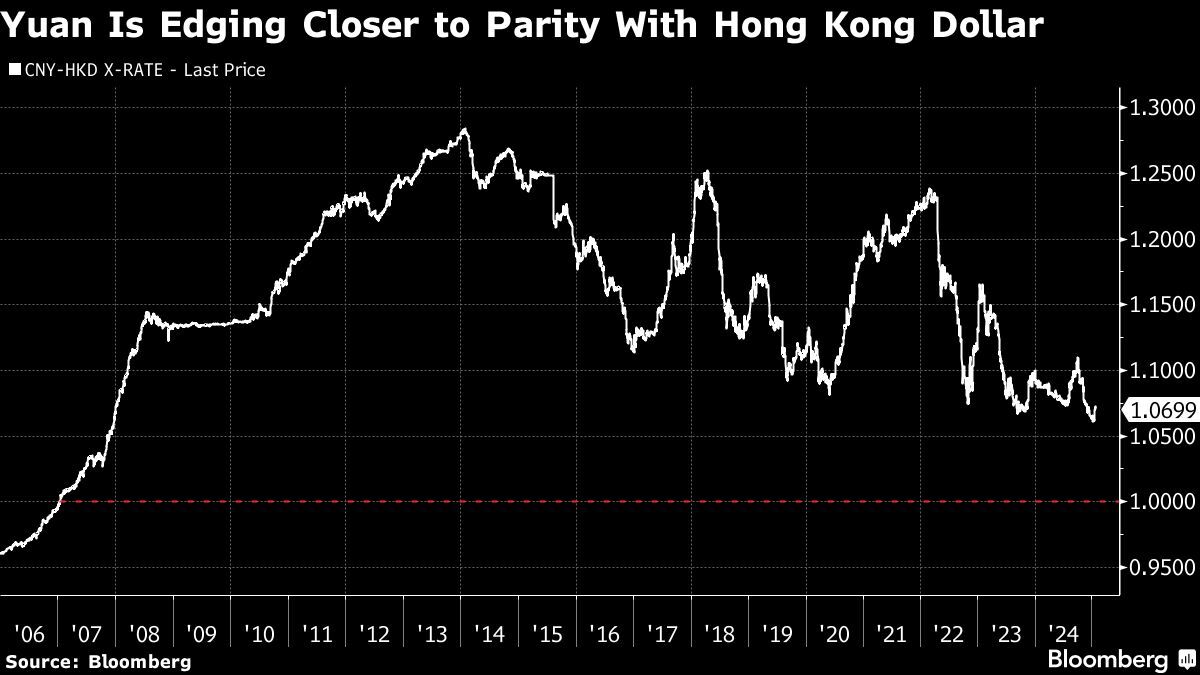
(Jan 25): Currency traders looking for their next big idea could do worse than talk to Wong, who runs a news stand in Hong Kong’s Central District.
Her business is one of many street stalls that line the city’s busy financial quarter, selling newspapers, magazines and bottled water to everyone from well-heeled executives to Chinese tourists on sightseeing trips.
This varied clientele has turned Wong into an informal currency trader — and right now, she is betting that the Chinese yuan will weaken to parity against the Hong Kong dollar.
The yuan has lost more than 12% of its value against its neighbouring currency over the past three years, putting it on course to hit parity for the first time since 2007. The decline has hurt spending by mainland Chinese tourists, encouraged locals to cross the border for shopping trips and forced consumers and businesses across the city to adjust.
Wong has put up a sign on the side of her news stand, demanding that any customer who wants to pay in yuan accepts a one-for-one exchange rate with the Hong Kong dollar. Tourists previously baulked at this rate but they’re increasingly willing to accept it, she said. Some are even asking her to give them a currency exchange without any goods changing hands.
The yuan has been dragged lower by a fragile Chinese economy facing deflationary pressure, capital outflows and evaporating bond yields. In contrast, the Hong Kong dollar — pegged to the greenback during a boom period for the US currency — is surging in value.
The currency shift has exacerbated pressure on Hong Kong, which suffered a 7.3% year-on-year contraction in retail sales in November, capping nine months of declines, according to the latest data.
The most bearish analysts think China’s currency could weaken near to 7.75 per US dollar by the third quarter, a move that would put the yuan close to the top of the Hong Kong dollar’s permitted trading band against the greenback.
There are some positives to the yuan’s decline, at least for those working in finance: Mainland investors chasing higher returns have rushed to buy overseas bonds, pushing southbound flows through a China-Hong Kong bond trading link to a two-year high in December. The issuance of dim sum bonds, offshore notes denominated in China’s currency, has surged as borrowers look for cheaper funding options.
But many people with ties to the city say the currency pair has already reached a pain point.
Rising costs
Edith, a mainland Chinese national studying for a masters degree at Hong Kong University, is among those who have been hit by the sinking value of the yuan against the Hong Kong dollar. She expects to pay around 20,000 yuan (US$2,760 or RM12,126) more for her degree than she previously calculated, thanks to the depreciation.
“My classmates and friends from mainland are complaining about the stronger Hong Kong dollar,” Edith said, requesting to be identified by only her first name due to privacy concerns.
Cherry Su, who works at an internet company in Guangzhou, has turned to her friends to help pay off a Hong Kong dollar health insurance plan early, in an effort to overcome restrictions on moving money out of mainland China.
Su entered into the insurance plan last year, signing up for 25 years of payments. But after becoming increasingly worried about a further weakening of the exchange rate, she is relying on informal channels to help her make large early payments.
The move is also reigniting difficult questions about Hong Kong’s 41-year-old currency peg against the greenback.
Speculation about how long Hong Kong will maintain its dollar peg has raged for years, but with the greenback soaring and China’s government still trying to get its economy back on track, this talk has taken on extra importance.
Hong Kong Monetary Authority Chief Executive Eddie Yue tried to quell speculation earlier this month, declaring that “we have no intention and we see no need” to change the currency regime. But the statement appears to have done little to end talk about the future of the peg.
“Obviously in any business you should always have plan B — let’s examine any other scheme that is possible,” said Hong Kong nightclub mogul Allan Zeman, referring to the peg. If the yuan weakens any further “we will be in trouble”.
Uploaded by Chng Shear Lane

